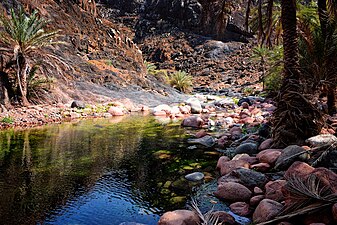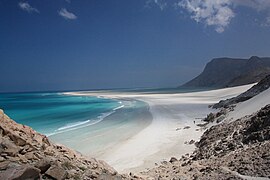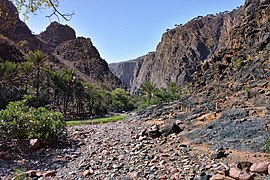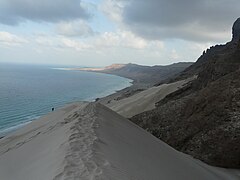Socotra
 Landsat view of Socotra | |
 | |
| Geography | |
| Location | Between the Guardafui Channel and the Arabian Sea |
| Coordinates | 12°30′36″N 53°55′12″E / 12.51000°N 53.92000°E |
| Archipelago | Socotra |
| Area | 3,796 km2 (1,466 sq mi) |
| Length | 132 km (82 mi) |
| Width | 50 km (31 mi) |
| Highest elevation | 1,503 m (4931 ft) |
| Highest point | Mashanig, Hajhir Mountains |
| Administration | |
| Region | |
| Governorate | Socotra Archipelago |
| Districts | Hadibu (east) Qulansiyah wa 'Abd-al-Kūrī (west) |
| Capital and largest city | Hadibu (pop. 8,545) |
| Demographics | |
| Population | 60,000 |
| Pop. density | 11.3/km2 (29.3/sq mi) |
| Ethnic groups | predominantly Soqotris; minority Yemenis, Hadharem, and Mehris |
Socotra (/səˈkoʊtrə, soʊ-, ˈsɒkətrə/; Arabic: سُقُطْرَىٰ Suquṭrā) or Saqatri (Soqotri: ساقطْري Saqaṭri) is an island of Yemen in the Indian Ocean.[1][2] Lying between the Guardafui Channel and the Arabian Sea and near major shipping routes, Socotra is the largest of the six islands in the Socotra archipelago. Since 2013, the island has been part of the Socotra Archipelago Governorate.
The island of Socotra represents around 95% of the landmass of the Socotra archipelago. It lies 380 kilometres (205 nautical miles) south of the Arabian Peninsula,[3] 240 km (130 nmi) east of Somalia. The island is geographically a part of Africa. The island is isolated and home to a high number of endemic species. Up to a third of its plant life is endemic. Due to the island's unusual geography, it has been described as "the most alien-looking place on Earth".[4] The island measures 132 km (82 mi) in length and 42 km (26 mi) across at its widest.[5] In 2008, Socotra was recognised as a UNESCO World Heritage Site.[6]
The island is under the de facto control of the Southern Transitional Council, a United Arab Emirates-backed, pro-Presidential Leadership Council (PLC), "secessionist" faction in Yemen's ongoing civil war.[7]
Etymology
[edit]Scholars' views vary regarding the origin of the name of the island. The name Socotra may derive from:
- A Greek name that is derived from the name of a South Arabian tribe mentioned in Sabaic and Ḥaḑramitic inscriptions as Dhū-Śakūrid (S³krd).[8]
- The Arabian terms suq, market, and qutra, a vulgar form of qatir, which refers to dragon's blood.[9]
History
[edit]There was initially an Oldowan lithic culture in Socotra. Oldowan stone tools were found in the area around Hadibo in 2008.[10] Socotra played an important role in the ancient international trade and appears as Dioskouridou (Διοσκουρίδου νῆσος), meaning "the island of the Dioscuri" in the Periplus of the Erythraean Sea, a first-century CE Greek navigation aid.[11]
The Hoq Cave contains a large number of inscriptions, drawings and archaeological objects. Further investigation showed that these had been left by sailors who visited the island between the first century BCE and the sixth century CE. The texts are written in the Indian Brāhmī, South Arabian, Ethiopic, Greek, Palmyrene and Bactrian languages. This corpus of nearly 250 texts and drawings constitutes one of the main sources for the investigation of Indian Ocean trade networks in that time period.[12]
In 880, an Aksumite expeditionary force conquered the island, and an Oriental Orthodox bishop was consecrated. The Ethiopians were later dislodged by a large armada sent by Imam Al-Salt bin Malik of Oman.[13] According to the Persian geographer Ibn al-Mujawir, who testifies having arrived in Socotra from India in 1222, there were two groups of people on the island, the indigenous mountain dwellers and the foreign coastal dwellers. There were large settlements of Indian traders from Sindh and Balochistan.[14]
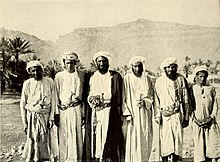
In 1507, a Portuguese fleet commanded by Tristão da Cunha with Afonso de Albuquerque landed at Suq and captured the port after a stiff battle against the Mahra Sultanate. Their objective was to set a base in a strategic place on the route to India. The lack of a proper harbor and the infertility of the land led to famine and sickness in the garrison, and the Portuguese abandoned the island in 1511.[16] The Mahra sultans took back control of the island, and the inhabitants were converted to Islam.[17]
In 1834, the East India Company stationed a garrison on Socotra, in the expectation that the Mahra sultan of Qishn and Socotra would accept an offer to sell the island. The lack of good anchorages proved to be as much a problem for the British as the Portuguese. The sultan refused to sell, and the British left in 1835. After the capture of Aden by the British in 1839, they lost interest in acquiring Socotra. In 1886, the British government decided to conclude a protectorate treaty with the sultan in which he promised this time to "refrain from entering into any correspondence, agreement, or treaty with any foreign nation or power, except with the knowledge and sanction of the British Government".[18] In October 1967, in the wake of the departure of the British from Aden and southern Arabia, the Mahra Sultanate was abolished.
On 30 November of the same year, Socotra became part of South Yemen. Between 1976 and 1979, the island served as a base for the Soviet Navy.[19][20] Although the South Yemeni government and president, Ali Nasir Muhammad, had denied their existence.[21]
Since Yemeni unification in 1990, Socotra has been a part of the Republic of Yemen, affiliated first to Aden Governorate. Then in 2004, it was moved to be a part of the Hadhramaut Governorate. Later in 2013, it became a governorate of its own.
Socotra was ravaged by the 26 December 2004 tsunami causing a child's death and the wreckage of 40 fishing boats although the island is 4,600 km (2,858 mi) away from tsunami epicentre off the west coast of Aceh, Indonesia.[22] In 2015, the cyclones Chapala and Megh struck the island, causing severe damage to its infrastructure.[23]
Beginning in 2015, the UAE began increasing its presence on Socotra, first with humanitarian aid in the wake of tropical cyclones Chapala and Megh, and eventually establishing a military presence on the island. On April 30, 2018, the UAE, as part of the ongoing Saudi Arabian–led intervention in Yemen, landed troops on the island and took control of Socotra Airport and seaport.[24] On May 14, 2018, Saudi troops were also deployed on the island, and a deal was brokered between the UAE and Yemen for a joint military training exercise and the return of administrative control of the airport and seaport to Yemen.[25][26]

Geography
[edit]

Socotra is one of the most isolated landforms on Earth of continental origin (i.e. not of volcanic origin). The archipelago was once part of the supercontinent of Gondwana and detached during the Miocene epoch, in the same set of rifting events that opened the Gulf of Aden to its northwest.[27] Culturally and politically, the island is a part of Yemen, but geographically it belongs to Africa as it represents a continental fragment that is geologically linked to the continental African Somali Plate.[28]
The archipelago consists of the main island of Socotra (3,665 km2 or 1,415 sq mi), three smaller islands, Abd al Kuri, Samhah and Darsa, and two rocky islets, Ka'l Fir'awn and Sābūnīyah, both uninhabitable by humans but important for seabirds.[29] The island is about 125 kilometres (78 mi) long and 45 kilometres (28 mi) north to south.[30] and has three major physical regions:
- The narrow coastal plains with its characteristic dunes, formed by monsoon winds blowing during three summer months. The wind takes up the coast sand in a spiral and, as a result, forms the snow-white Socotran sand dunes.[31]
- The limestone plateaus of Momi, Homhil and Diksam with its characteristic karst topography based on limestone rock areas intersected with inter-hill plains. For centuries until recently Socotra's main economic activity was subsistent transhumant animal husbandry, predominantly goats and sheep on these plateaus. The outcome is a unique and still active cultural landscape of agro-pastoralism with its characteristic rainwater harvesting systems.[32]
- A central massif, the Hajhir Mountains, composed of granite and metamorphic rocks.[33] rising to 1,503 metres (4,931 ft).[34]
-
Sand dunes on the northeast coast
-
Momi Plateau with rainwater harvest structures, water storage body, shelter for herders
-
A wadi in Socotra
Climate
[edit]The climate of Socotra is classified in the Köppen climate classification as BWh and BSh, meaning a transitional hot desert climate and a semi-desert climate with a mean annual temperature over 25 °C (77 °F). Yearly rainfall is light but is fairly spread throughout the year. Orographic lift provided by the interior mountains, especially during the northeast monsoon from October to December, results in the highest inland areas averaging as much as 800 millimetres (31.50 in) per year and receiving over 250 millimetres (9.84 in) per month during November and December.[35] The southwest monsoon season from June to September brings strong winds and high seas.
In an extremely unusual occurrence, the normally arid western side of Socotra received more than 410 millimetres (16.14 in) of rain from Cyclone Chapala in November 2015.[36] Cyclones rarely affect the island, but in 2015 Cyclone Megh became the strongest, and only, major cyclone to strike the island directly.
| Climate data for Socotra | |||||||||||||
|---|---|---|---|---|---|---|---|---|---|---|---|---|---|
| Month | Jan | Feb | Mar | Apr | May | Jun | Jul | Aug | Sep | Oct | Nov | Dec | Year |
| Record high °C (°F) | 30.0 (86.0) |
31.7 (89.1) |
32.8 (91.0) |
37.2 (99.0) |
38.5 (101.3) |
40.6 (105.1) |
37.4 (99.3) |
34.4 (93.9) |
35.6 (96.1) |
37.0 (98.6) |
33.0 (91.4) |
30.6 (87.1) |
40.6 (105.1) |
| Mean daily maximum °C (°F) | 27.1 (80.8) |
27.8 (82.0) |
29.2 (84.6) |
31.8 (89.2) |
34.6 (94.3) |
33.8 (92.8) |
32.3 (90.1) |
32.4 (90.3) |
33.2 (91.8) |
30.8 (87.4) |
29.6 (85.3) |
28.3 (82.9) |
30.8 (87.4) |
| Daily mean °C (°F) | 24.8 (76.6) |
24.8 (76.6) |
26.3 (79.3) |
28.7 (83.7) |
31.3 (88.3) |
30.8 (87.4) |
29.5 (85.1) |
29.5 (85.1) |
29.3 (84.7) |
27.9 (82.2) |
27.0 (80.6) |
25.8 (78.4) |
28.0 (82.4) |
| Mean daily minimum °C (°F) | 22.6 (72.7) |
21.7 (71.1) |
23.3 (73.9) |
25.5 (77.9) |
28.0 (82.4) |
27.9 (82.2) |
26.8 (80.2) |
26.5 (79.7) |
26.4 (79.5) |
24.9 (76.8) |
24.4 (75.9) |
23.3 (73.9) |
25.1 (77.2) |
| Record low °C (°F) | 17.0 (62.6) |
17.2 (63.0) |
18.9 (66.0) |
20.3 (68.5) |
21.2 (70.2) |
22.8 (73.0) |
21.7 (71.1) |
22.0 (71.6) |
22.2 (72.0) |
19.4 (66.9) |
18.9 (66.0) |
17.0 (62.6) |
17.0 (62.6) |
| Average rainfall mm (inches) | 2.5 (0.10) |
2.5 (0.10) |
10.2 (0.40) |
0.0 (0.0) |
2.5 (0.10) |
30.5 (1.20) |
0.0 (0.0) |
0.0 (0.0) |
2.5 (0.10) |
10.2 (0.40) |
50.8 (2.00) |
81.3 (3.20) |
193.0 (7.60) |
| Average rainy days (≥ 0.1 mm) | 2.4 | 0.8 | 0.4 | 1.0 | 0.4 | 0.8 | 0.2 | 0.0 | 0.6 | 2.2 | 7.7 | 5.2 | 21.7 |
| Average relative humidity (%) | 70 | 68 | 67 | 66 | 62 | 60 | 58 | 57 | 62 | 69 | 72 | 73 | 65 |
| Source: Deutscher Wetterdienst[37] | |||||||||||||
Demographics
[edit]

Most of the inhabitants are indigenous Soqotri people from Al-Mahrah tribe, who are of Southern Arabian descent from Al Mahrah Governorate,[38] and are said to be especially closely related with the Qara and Mahra groups of Southern Arabia.[39] Some of the inhabitants are African, descending from former slaves who settled on the island.[40] The majority of male residents on Socotra are reported to be in the J* subclade of Y-DNA haplogroup J. Several of the female lineages, notably those in mtDNA haplogroup N, are unique to the island.[41]
Almost all inhabitants of Socotra, numbering about 50,000, live on the main island of the archipelago.[42] The principal city, Hadibu (with a population of 8,545 at the census of 2004); the second largest town, Qalansiyah (population 3,862); and Qād̨ub (population 929) are all located on the north coast of the island of Socotra.[43] Only about 450 people live on 'Abd-al-Kūrī and 100 on Samha; the island of Darsa and the islets of the archipelago are uninhabited.[44]
Language
[edit]The island is home to the Semitic language Soqotri, which is related to such other Modern South Arabian languages on the Arabian mainland as Mehri, Harsusi, Bathari, Shehri, and Hobyot, which became the subject of European academic study in the nineteenth century.[45][46]
There is an ancient tradition of poetry and a poetry competition is held annually on the island.[47] The first attested Socotran poet is thought to be the ninth-century Fatima al-Suqutriyya, a popular figure in Socotran culture.[48] Socotra Swahili is extinct.[49]
Religion
[edit]The earliest account concerning the presence of Christians in Socotra stems from the early-medieval 6th century CE Greek merchant Cosmas Indicopleustes[50] Later the Socotrans joined the Assyrian church.[51] During the 10th century, Arab geographer Abu Muhammad al-Hasan al-Hamdani recorded during his visits that most of the islanders were Christian.
Christianity went into decline when the Mahra sultanate took power in the 16th century, and the populace had become mostly Muslim by the time the Portuguese arrived later that century.[52] An 1884 edition of Nature writes that the disappearance of Christian churches and monuments can be accounted for by a Wahhabi excursion to the island in 1800.[53] Today the only remnants of Christianity are some cross engravings from the first century CE, a few Christian tombs, and some church ruins.[54]
Transport
[edit]Public transport on Socotra is limited to a few minibuses; car hire usually means hiring a 4WD car and a driver.[55][56] Transport is a delicate matter on Socotra as road construction is considered locally to be detrimental to the island and its ecosystem. In particular, damage has occurred via chemical pollution from road construction while new roads have resulted in habitat fragmentation.[57]
The only port on Socotra is 5 kilometres (3 miles) east of Hadibu. Ships connect the port with the Yemeni coastal city of Mukalla. The journey takes 2–3 days, and the service is used mostly for cargo.[58] The UAE funded the modernization of the port on Socotra.[59]
Yemenia and Felix Airways flew from Socotra Airport to Sana'a and Aden via Riyan Airport. As of March 2015, due to ongoing civil war involving Saudi Arabia's Air Force, all flights to and from Socotra were cancelled.[60] During the deployment of Emirati troops and aid to the Island, multiple flight connections were made between Abu Dhabi and Hadibu as part of Emirati effort to provide Socotra residents with access to free healthcare and provide work opportunities.[61] Currently, there are scheduled flights from Cairo and Abu Dhabi to Socotra once per week.[62]
Tourism
[edit]Among 19th-century visitors to the island came British celebrity explorers Theodore and Mabel Bent, and their party, from mid December 1896 to mid February 1897.[63]
Prior to the construction of the Socotra airport, the island could only be reached by a cargo ship. The ideal time to visit Socotra is from October to April; the remaining months usually have heavy monsoon rainfall, making it difficult for tourists; flights also usually get cancelled.[64] The island lacks any well-established hotels, although there are a few guesthouses for the travelers to stay during their short visits.[65] The island received over 1,000 tourists each year until 2014,[66] which has since been affected by the civil war.
Tourism to the island has increased over the years as many operators have started offering trips to the island, which Gulf Today claimed “will become a dream destination despite the country's conflict”. In May 2021, the Ministry of Information stated that the UAE is violating the island and has been planning to control it for years. It is running illegal trips for foreign tourists without taking any permission from the Yemeni government.[67]
Gallery
[edit]- Other sights
-
Wadi Dirhur canyon on the Diksam Plateau
-
Ar'ar spot
See also
[edit]- Galápagos Islands, an archipelago of Ecuador which is also famous for its isolated geography and plant and animal species
- Masirah Island, another island with a rugged terrain off the coast of the Arabian Peninsula
- List of islands of Yemen
References
[edit]- ^ Burrowes, Robert D. (2010). Historical Dictionary of Yemen. Scarecrow Press. pp. 361–362. ISBN 978-0-8108-5528-1.
- ^ Robinson, Peg; Hestler, Anna; Spilling, Jo-Ann (2019). Yemen. Cavendish Square. p. 15. ISBN 978-1-50264-162-5.
- ^ "Socotra islands scenery in Yemen". youth.cn. China Youth International. 25 April 2008. Archived from the original on 5 September 2017. Retrieved 4 December 2009.
- ^ Huntingford, George Wynn Brereton (1980). The Periplus of the Erythraean Sea. Hakluyt Society. p. 103. ISBN 978-0-904180-05-3.
- ^ Abrams, Avi (4 September 2008). "The Most Alien-Looking Place on Earth". DarkRoastedBlend.com.
- ^ "EU to protect Socotra archipelago environment". SabaNews.net. Yemen News Agency. 15 April 2008.
- ^ "Yemen's Socotra, isolated island at strategic crossroads". The Economic Times. 7 June 2021. Retrieved 4 May 2022.
- ^ "Cambridge Scholars Publishing. Ancient South Arabia through History". www.cambridgescholars.com. pp. 5–6. Retrieved 20 February 2020.
"As for Śakūrid (S³krd), this name appears to be the basis of the Greek name for Soqoṭrā, Dioskouridēs, via a reconstructed *Dhū-Śakūrid.12
- ^ A Historical Genealogy of Socotra as an Object of Mythical Speculation, Scientific Research & Development Experiment.
- ^ Zhukov, Valery A. (2014) The Results of Research of the Stone Age Sites in the Island of Socotra (Yemen) in 2008-2012. - Moscow: Triada Ltd. 2014, pps 114, ill. 134 (in Russian) ISBN 978-5-89282-591-7.
- ^ Great Britain. Naval Intelligence Division (2005). "Appendix: Socotra". Western Arabia and the Red Sea. Hoboken: Taylor and Francis. p. 611. ISBN 9781136209956.
- ^ Bukharin, Mikhail D.; De Geest, Peter; Dridi, Hédi; Gorea, Maria; Jansen Van Rensburg, Julian; Robin, Christian Julien; Shelat, Bharati; Sims-Williams, Nicholas; Strauch, Ingo (2012). Strauch, Ingo (ed.). Foreign Sailors on Socotra. The inscriptions and drawings from the cave Hoq. Bremen: Dr. Ute Hempen Verlag. p. 592. ISBN 978-3-934106-91-8.
- ^ Martin, E. G. (1974). "Mahdism and holy wars in Ethiopia before 1600". Proceedings of the Seminar for Arabian Studies. 4: 114. JSTOR 41223140.
- ^ G. Rex Smith, Ibn al-Mujāwir on Dhofar and Socotra, in: Proceedings of the Seminar for Arabian Studies, Vol. 15, 1985.
- ^ Photo from ‘The Isle of Frankincense’ by Charles K. Moser, formerly United States Consul-General to Aden, Arabia. Page 271 in The National Geographic Magazine, January to June 1918, Vol. XXXIII, 266–278.
- ^ Diffie, Bailey Wallys; Winius, George Davison (1977). Foundations of the Portuguese empire, 1415–1580. University of Minnesota Press. p. 233. ISBN 978-0-8166-0782-2.
- ^ Bowersock, Glen Warren; Brown, Peter; Grabar, Oleg (1999). Late Antiquity: A Guide to the Postclassical World. Harvard University Press. p. 753. ISBN 978-0674511736.
- ^ A Collection of Treaties, Engagements and Sunnuds related to India and Neighbouring Countries, Calcutta, 1909, volume VIII, page 185.
- ^ "The USSR and the Yemens: Moscow's Foothold on the Arabian Peninsula" (PDF). National Foreign Assessment Center. Retrieved 17 July 2024.
- ^ "ТОП-6 самых экзотических стран-друзей СССР, где были советские военные базы" (in Russian). 18 February 2019. Retrieved 17 July 2024.
- ^ Muḥammad, ʻAlī Nāṣir (2019). Dhākirat waṭan: ʻAdan min al-iḥtilāl ilá al-istiqlāl (al-Ṭabʻah al-ūlá ed.). Bayrūt: Riyāḍ al-Rayyis lil-Kutub wa-al-Nashr. pp. 449–453. ISBN 978-9953-21-704-8. OCLC 1089880767.
- ^ Hermann M. Fritz; Emile A. Okal (2008). "Socotra Island, Yemen: field survey of the 2004 Indian Ocean tsunami". Natural Hazards. 46 (1): 107–117. Bibcode:2008NatHa..46..107F. doi:10.1007/s11069-007-9185-3. S2CID 14199971.
- ^ Yemen: Cyclones Chapala and Megh Flash Update 11 (PDF) (Report). United Nations Office for the Coordination of Humanitarian Affairs. 19 November 2015. ReliefWeb. Retrieved 3 February 2016.
- ^ "Yemen officials say Emiratis boost forces on Socotra island". The Washington Post. Archived from the original on 2 May 2018.
- ^ "Yemen PM: Crisis over UAE deployment to Socotra over". Al Jazeera.
- ^ "Yemen, UAE Agree on Deal Over Socotra". Albawaba News.
- ^ "Socotra Archipelago – a lifeboat in the sea of changes: advancement in Socotran insect biodiversity survey" (PDF). Acta Entomologica Musei Nationalis Pragae. 52 (supplementum 2): 1–26.
- ^ Beydoun, Z. R.; Bichan, H. R. (1970). "The Geology of Socotra Island, Gulf of Aden". Quarterly Journal of the Geological Society of London. 3: 413–466.
- ^ Shobrak, Mohammed; Alsuhaibany, Abdullah; Al-Sagheir, Omer (November 2003). "Status of Breeding Seabirds in the Red Sea and Gulf of Aden" (PDF). PERSGA Technical Series (in English and Arabic) (8). Photographs by Abdullah Alsuhaibany. Jeddah, Saudi Arabia: Regional Organization for Conservation of Environment of the Red Sea and Gulf of Aden (PERSGA). Archived from the original (PDF) on 15 February 2019. Retrieved 7 May 2013.
- ^ "Natural History". DBT Socotra Adventure Tour. Archived from the original on 18 March 2016. Retrieved 8 October 2011.
- ^ Sand dunes of the NE-coast Retrieved 4 March 2023.
- ^ Elie, Serge D. (2008). "The Waning of Soqotra's Pastoral Community: Political Incorporation as Social Transformation". Human Organization. 67 (3): 335–345. doi:10.17730/humo.67.3.lm86541uv4765823.
- ^ "Socotra Fauna and Flora". Archived from the original on 18 March 2016. Retrieved 10 January 2010.
- ^ "Socotra High Point, Yemen". Peakbagger.com. Retrieved 8 October 2011.
- ^ Scholte, Paul, and, De Geest, Peter; ‘The climate of Socotra Island (Yemen): A first-time assessment of the timing of the monsoon wind reversal and its influence on precipitation and vegetation patterns’; Journal of Arid Environments, vol. 74, issue 11 (November 2010); pp. 1507-1515
- ^ Fritz, Angela (5 November 2015). "The mediocre model forecasts of Cyclone Chapala's rainfall over Yemen".
- ^ "Klimatafel von Sokotra (Suqutrá), Insel / Arabisches Meer / Jemen" (PDF). Baseline climate means (1961–1990) from stations all over the world (in German). Deutscher Wetterdienst. Retrieved 26 April 2018.
- ^ Schurhammer, Georg (1982). Francis Xavier; His Life, His Times: India, 1541–1544. Vol. 2. Jesuit Historical Institute. p. 122.
- ^ Lockyer, Norman, ed. (1884). "Socotra". Nature. 29 (755): 575–576. Bibcode:1884Natur..29R.575.. doi:10.1038/029575b0.
- ^ Gintsburg, Sarali; Esposito, Eleonora (2022). "The Asymmetric Linguistic Identities of African Soqotris". Language and Identity in the Arab World. Routledge. ISBN 9781003174981.
- ^ Černý, Viktor; Pereira, Luísa; Kujanová, Martina; Vašíková, Alžběta; Hájek, Martin; Morris, Miranda; Mulligan, Connie J. (April 2009). "Out of Arabia—The settlement of Island Soqotra as revealed by mitochondrial and Y chromosome genetic diversity". American Journal of Physical Anthropology. 138 (4): 439–47. doi:10.1002/ajpa.20960. PMID 19012329.
- ^ FACTBOX-Socotra, jewel of biodiversity in Arabian Sea. Reuters, 2008-04-23
- ^ "Final Census Results2004: The General Frame of the Population Final Results (First Report)". The General Population Housing and Establishment Census2004. Central Statistical Organisation. 6 January 2007. Archived from the original on 21 May 2013. Retrieved 6 July 2013.
- ^ "Default Page". www.socotraproject.org.
- ^ Mansur Mirovalev (2015). "Russian Roots and Yemen's Socotra Language". Al-Jazeera. Retrieved 9 March 2019.
- ^ Rupert Hawksley (5 January 2019). "How the Yemeni island of Sokotra is forging its own future". The National: Arts and Culture. Retrieved 9 March 2019.
- ^ Morris, Miranda J. (1 January 2013). "The use of 'veiled language' in Soqoṭri poetry". Proceedings of the Seminar for Arabian Studies. 43: 239–244. JSTOR 43782882.
- ^ Serge D. Elie, 'Soqotra: South Arabia’s Strategic Gateway and Symbolic Playground', British Journal of Middle Eastern Studies, 33.2 (November 2006), 131-60, doi:10.1080/13530190600953278 (p. 158 n. 105).
- ^ Maho, Jouni Filip (4 June 2009). "G40 : Swahili Group". New Updated Guthrie List Online (2nd ed.). p. 49. Archived from the original (PDF) on 3 February 2018. Retrieved 18 June 2022.
G411 * . † – Socotra Swahili
- ^ Jansen van Rensburg, Julian (2018). "Rock Art of Soqotra, Yemen: A Forgotten Heritage Revisited". The Artist and Journal of Home Culture. 7: 99.
- ^ "Socotra history :: Socotra Eco-Tours". www.socotra-eco-tours.com. Retrieved 2 September 2015.
- ^ "The history of Socotra". www.socotraislandadventure.com. Archived from the original on 6 December 2013. Retrieved 2 September 2015.
- ^ Lockyer, Sir Norman (1 January 1884). Nature. Nature Publishing Group.
- ^ "Socotra history :: Socotra Eco-Tours". www.socotra-eco-tours.com.
- ^ "Default Page". www.socotraproject.org.
- ^ Holmes, Oliver (23 June 2010). "Socotra: The Other Galápagos Awaits Tourists". Time. Archived from the original on 25 June 2010. Retrieved 6 July 2013.
- ^ Lisa, Banfield. "Past and present human impacts on the biodiversity of Socotra Island - Paper" (PDF). www.friendsofsoqotra.org. Archived from the original (PDF) on 14 March 2021. Retrieved 18 July 2014.
- ^ Maritime transport to Socotra Retrieved 4 January 2023.
- ^ "#UAE National Day 46: WAM Report 6 - UAE aid to Yemen". ReliefWeb. 28 November 2017.
- ^ Ghattas, Abir. "Yemen's No Fly Zone: Thousands of Yemenis are Stranded Abroad". Retrieved 8 April 2015.
- ^ "Socotra island: The Unesco-protected 'Jewel of Arabia' vanishing amid Yemen's civil war". The Independent. 2 May 2018.
- ^ Flights to Socotra Retrieved 4 March 2023.
- ^ The party included the young Ernest Bennett. See Mabel Bent, Southern Arabia, London, 1900, pp.343-390; The Travel Chronicles of Mrs J Theodore Bent, vol. 3, Oxford, 2010, pp.286-308.
- ^ Burdick, Alan (25 March 2007). "The Wonder Land of Socotra, Yemen". The New York Times. Retrieved 17 July 2018.
- ^ Kedem, Shoshana. "Tourism In The Time Of Conflict: Yemeni Island Of Socotra Is Open To Travelers". Inc. Arabia. Archived from the original on 17 July 2018. Retrieved 17 July 2018.
- ^ "Wanna go to Socotra? Good luck at the moment". The Adventures of Lil Nicki. 6 July 2017. Retrieved 17 July 2018.
- ^ "UAE operating illegal tourist trips to Yemen's Socotra". Middle East Monitor. 10 May 2021. Retrieved 10 May 2021.
Further reading
[edit]- Agafonov, Vladimir (2007). "Temethel as the Brightest Element of Soqotran Folk Poetry". Folia Orientalia. 42/43 (2006/07): 241–249.
- Agafonov, Vladimir (2013). Mehazelo – Cinderella of Socotra. CreateSpace Independent Publishing Platform. ISBN 978-1482319224.
- Botting, Douglas (2006) [1958]. Island of the Dragon's Blood (2nd ed.). Steve Savage Publishers Limited. ISBN 978-1-904246-21-3.
- Burdick, Alan (25 March 2007). "The Wonder Land of Socotra, Yemen". The New York Times.
- Casson, Lionel (1989). The Periplus Maris Erythraei. Princeton University Press. ISBN 978-0-691-04060-8.
- Cheung, Catherine; DeVantier, Lyndon (2006). Van Damme, Kay (ed.). Socotra: A Natural History of the Islands and their People. Odyssey Books & Guides. ISBN 978-962-217-770-3.
- Doe, D. Brian (1970). Field, Henry; Laird, Edith M. (eds.). Socotra: An Archaeological Reconnaissance in 1967. Miami: Field Research Projects.
- Doe, D. Brian (1992). Socotra: Island of Tranquility. London: Immel.
- Elie, Serge D. (2004). "Hadiboh: From Peripheral Village to Emerging City". Chroniques Yemenites. 12.
- Elie, Serge D. (November 2006). "Soqotra: South Arabia's Strategic Gateway and Symbolic Playground". British Journal of Middle Eastern Studies. 33 (2): 131–160. doi:10.1080/13530190600953278. ISSN 1353-0194. S2CID 129912477.
- Elie, Serge D. (June 2007). The Waning of a Pastoralist Community: An Ethnographic Exploration of Soqotra as a Transitional Social Formation (D.Phil Dissertation thesis). University of Sussex.
- Elie, Serge D. (2008). "The Waning of Soqotra's Pastoral Community: Political Incorporation as Social Transformation". Human Organization. 67 (3): 335–345. doi:10.17730/humo.67.3.lm86541uv4765823.
- Elie, Serge D. (2009). "State-Community Relations in Yemen: Soqotra's Historical Formation as a Sub-National Polity". History and Anthropology. 20 (4): 363–393. doi:10.1080/02757200903166459. S2CID 111387231.
- Elie, Serge D. (2010). "Soqotra: The Historical Formation of a Communal Polity". Chroniques Yéménites. 16 (16): 31–55. doi:10.4000/cy.1766.
- Elie, Serge D. (2012). "Fieldwork in Soqotra: The Formation of a Practitioner's Sensibility". Practicing Anthropology. 34 (2): 30–34. doi:10.17730/praa.34.2.7279k63434142762.
- Elie, Serge D. (2012). "Cultural Accommodation to State Incorporation: Language Replacement on Soqotra Island". Journal of Arabian Studies. 2 (1): 39–57. doi:10.1080/21534764.2012.686235. S2CID 144803493.
- Miller, A.G. & Morris, M. (2004) Ethnoflora of the Socotra Archipelago. Royal Botanic Garden Edinburgh.
- Naumkin, V. V.; Sedov, A. V. (1993). "Monuments of Socotra". In Boussac, Marie-Françoise; Salles, Jean-François (eds.). Athens, Aden, Arikamedu: Essays on the interrelations between India, Arabia and the Eastern Mediterranean. Delhi: Manohar. pp. 193–250. ISBN 978-81-7304-079-5.
- Peutz, Nathalie (2018). Islands of Heritage: Conservation and Transformation in Yemen. Stanford, CA: Stanford University Press. ISBN 9781503607156.
- Schoff, Wilfred H. (1974) [1912]. The Periplus of the Erythraean Sea (2nd. ed.). New Delhi: Oriental Books Reprint Corporation.
- Zhukov, Valery A. (2014). The Results of Research of the Stone Age Sites in the Island of Socotra (Yemen) in 2008-2012 (in Russian). Moscow: Triada. ISBN 978-5-89282-591-7.
External links
[edit]- LA Times photogallery
- Royal Botanic Garden, Edinburgh: Soqotra's Misty Future (see page 5 for information on dragon's blood)
- Global organisation of Friends for Soqotra in any aspect based in Edinburgh, Scotland
- Audio interview with Socotra resident
- Carter, Mike. "The land that time forgot", The Observer. Sunday, April 16, 2006.
- A Historical Genealogy of Socotra as an Object of Mythical Speculation, Scientific Research & Development Experiment
- SCF Organisation
- An article in T Style Magazine – NYTimes
- "Suḳuṭra" in the Encyclopaedia of Islam
- Socotra Information Project
- "15 Pictures of 'The Most Alien-Looking Place on Earth'"—photo essay
- Socotra: The Hidden Land Archived 8 August 2017 at the Wayback Machine—Documentary film of the Island of Socotra






